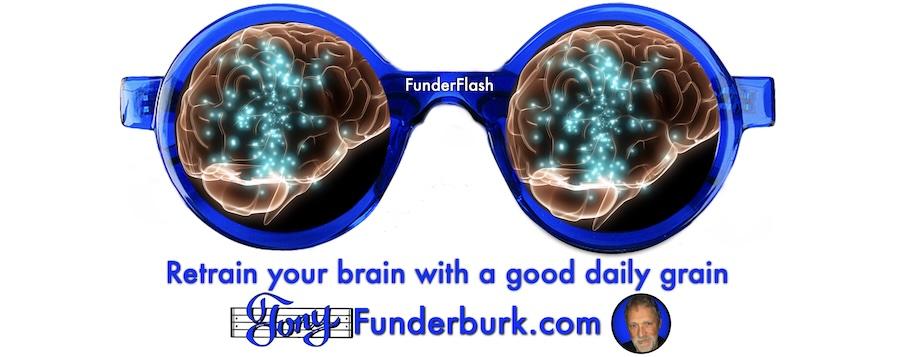Get The The Power of God's Love Podcast Delivered to Your Device Apple Podcasts | Spotify | Amazon Music | Android | Pandora | iHeartRadio | Podchaser | Podcast Index | TuneIn | Deezer | RSS | More
Sure, I could’ve (and maybe should’ve) said daily bread instead of daily grain. But that wouldn’t have rhymed with the retrain your brain part. So, I took some poetic license. And there you have it.Now, what’s all this retrain your brain talk?
Well, I could be talking about anxiety and depression, in which case I might give you a list of cognitive distortions like someone else did on another website. Here’s the list they shared.:
- Mental Filters: Mental filtering is when we filter out the positives of a situation and only focus on the negative. For example, that student left during my presentation because my presentation was not good.
- All-or-Nothing Thinking: Also known as black-and-white or polarized thinking, all-or-nothing thinking is when we believe there is no middle ground—something is perfect or a failure. For example, I missed that one question, so I did poorly on the test.
- Overgeneralization: Overgeneralization is when we conclude that, because of one bad experience, all events will have the same negative outcome. For example, I failed that test. This is going to be a horrible term.
- Magnification: Also known as catastrophizing, magnification involves exaggerating shortcomings and problems while downplaying positive qualities. For example, I failed that test. What if I flunk out of school?
- Jumping to Conclusions: We jump to conclusions when we make a hasty judgment or believe something to be true without considering the facts or initial assumptions. For example, she gave me that funny look. I think she hates me.
- Personalization and Blame: This is a cognitive distortion where we take everything personally and compare ourselves (e.g., He made that comment in class to get at me). With blaming, you place full blame on yourself or someone else for a situation that, in reality, was influenced by multiple factors beyond your control. For example, you’re the reason I had a bad day.
- Emotional Reasoning: Emotional reasoning is judging yourself or your situation based on emotions, assuming negative feelings reflect reality. For example, I feel guilty. I must be a bad person.
- Labeling: Labeling is a cognitive distortion that defines a person by their actions rather than viewing behavior separately from identity. For instance, you might call yourself a failure.
- Should Statements: Should statements focus on what you believe you should or must do. They create a constant sense of obligation, leading to anxiety and guilt. This mindset can make you feel like you’re always falling short.
- Discounting the Positive: This is a cognitive distortion where you overlook or dismiss the good things that have happened to you. For instance, instead of feeling proud of your achievement from hard work, you credit it to mere luck, disregarding your talent and effort.
But I’m not anxious or depressed.
And the number one reason for that is because God tells me not to be. Plus, it’s bad for your brain which makes it much more difficult to retrain. So I recommend living in joy and gratitude. Yeah, we should all be extremely grateful. We’re not getting what we deserve (you’re not getting those wages you actually deserve, right?).
My educated guess is that if you ARE anxious and/or depressed, you’re way too focused on YOU.
But sometimes things happen and you find yourself forced to focus more on YOU. Or at least parts of you. And that’s where I find myself currently. So that’s why I’ve been talking about it more lately.
Brain injuries, or other forms of head trauma, like stroke, are a challenge to the neuroplasticity of your brain and nervous system. And since that’s the boat, I find myself in, at this time, the information I find is fascinating. Here’s the basic gist of it that I found in an article:
~The brain rewires itself through neuroplasticity.
Brain cells send messages, which are the neural connections around the brain. However, when an individual experiences a stroke, the stroke damages some of the connections inside the brain in addition to the connection between the brain and the rest of the body. Rehabilitation activities help the brain make new neural connections in the healthy parts of your brain. And more neural connections can improve your brain’s ability to control your body and perform daily activities. Every time you take an extra step, say a new word or do an exercise, it helps the brain make new connections.~
My first gut reaction to all that is:
God is good. God is great.
He designed with love, not hate.
Each step I take, each word I say
Keeps me connected to the Way.
And so I’m thankful for each hour,
Every sunbeam, every flower,
Each connection in my brain,
And each one that I can retrain. © 2025 TF
By the way, I’m also extremely grateful you’re here reading this. I want you to know it’s no small thing to me that you have spent some of your precious, valuable time checking out what I share. I hope it blesses you in some way. And if there’s anything else you’d like me to focus on, don’t hesitate to ask.
Get my Tony’s Daily Devotional . Because the flashes of light I share on my website come directly to your inbox. So you can spend your valuable time reading instead of searching. And, to show my sincere appreciation for your time and attention, I’ll send you download links to books and music, right away. Kids from 3 to 103 can enjoy these fun goodies.
Stay tuned,



